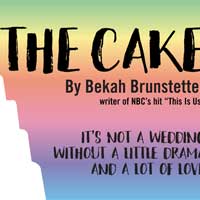
 [rating=3]Della, in her opening monologue in “The Cake”, delivers a straightforward talk about owning her own bakery. She explains why a baker should not scrimp on any of the necessary ingredients when creating tried-and-true recipes. In fact, she rebukes the amateurs among us to “always follow directions.” Her last statement could easily befit the way she has always led her life.
[rating=3]Della, in her opening monologue in “The Cake”, delivers a straightforward talk about owning her own bakery. She explains why a baker should not scrimp on any of the necessary ingredients when creating tried-and-true recipes. In fact, she rebukes the amateurs among us to “always follow directions.” Her last statement could easily befit the way she has always led her life.
One step removed from the headlines, “The Cake”, written by Bekah Brunstetter with fine directing by Steve Scott, is about a politically and religiously conservative woman (Connie Canaday Howard) who chooses not to bake a cake for a lesbian couple’s wedding, even though she is the godmother of one of the two brides. Jen, short for Jenny (Lisa Dawn) has known Della for practically her whole life. After Jen’s mother died five years prior, Della has become the closest person remaining from her home town of Winston-Salem, North Carolina. Since childhood, Jen has always loved eating Della’s scrumptious cakes: her pink lemonade cake, her carrot cake, and even her sinful Devil’s food cake, with every bite reminding her of good times with her now-deceased mother. Today she brings home Macy (Raina Lynn), a black woman whom she met in New York City, with the intent of spending $30,000 on their dream wedding. This happy event is supposed to take place at exactly the same venue as where her parents once got married. Jen is so excited to have Della bake one of her luscious creations for the occasion. That, of course, would be the proverbial “icing on the cake.”
A special symbol of love, the cake feeds both the appetite and the soul. In Brunstetter’s story, there is no legal battle or court case about the failure to bake a wedding cake for a same sex couple. Rather, the symbol of the cake serves to simultaneously unite and divide the characters; it provides a vehicle for them to express their feelings, wants, and needs in relation to their sexuality, cultural traditions, and religious beliefs. A funny but kinky take on intimate sex lives among straight and lesbian couples, the script incorporates considerable dialogue and passionate speeches, largely dealing with conflicted emotions. The meaning of sex versus love is explored, interspersed with frank sexual talk of bondage, lovemaking, and turn-ons. Then too, there is talk about the role of faith and the Bible in daily life and considerable references to the divisions in our country, having to do with race, politics, and culture. Humor is the lubricant for a perceptive tale that some may consider joyful and others might see as tragic or something in between, depending on the perspective that each audience member brings to the performance.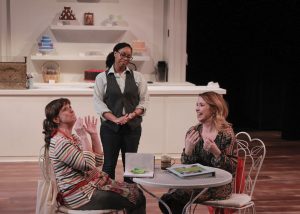
Marie Antoinette once said in a very different context, “Let them eat cake.” It is Della who believes that she could end the war with ISIS by providing each of their 80,000 fighters with their own personal dessert creation. Of course, this is never really meant to be taken literally, but she does understand a very important thing about human nature: that in smaller, more intimate settings, the use of food can create social interaction where it might have been absent. When food becomes the focal point, it allows people to let down their guard, especially regarding political disagreements and bedroom preferences. For example, the plainspoken banter between Della and her husband Tim (Bryan Burke) is made hilarious with the contraposition of food and sex. That said, one of Della’s goals is to compete in the Great American Bake-Off, a TV show where, over a period of several weeks, bakers show off their top creations and their baking skills. She would so much like to win first prize!
The technical aspects of this play are wonderful. Scenic design by Michael W. Moon is some of the best in the industry. The sets are magnificently fabricated, and the overall flow of one set to another is without equal. Garrett Bell’s lighting design and Christopher Kritz’s and Angela Geiss’s sound design do well in capturing Della’s vivid imagery on how she sees herself perform in the Great American Bake-Off episodes. Nicely done are all of the cakes being displayed at Della’s bakery, which can easily make a sweet-craving theatre-watcher very hungry; this is the work of properties designer Wendy A. Huber. Then there are the cakes in progress that Della makes during the performance. The beautiful cake she decorates at the beginning of the show is later substituted by an imaginary uneven, monstrous tower, as she finds herself questioning certain deeply-held beliefs.
While rifts and strains among the characters originate from honest places within themselves, there are moments when the characters seem overdone. Macy is often too strident, reflexive, and over-the-top. Jen is frequently too graphic in describing her sexual feelings. It’s unrealistic to believe that Della would change her opinions about Macy and Jen’s relationship by listening to their tales, especially if she was raised to believe that same sex marriage is an abomination. Tim tries taking the lead from Della and works on changing himself to please his wife. He is the most plain-spoken character of all and the most believable. With the characters simultaneously used as typecasts to present a strong and definitive point of view while representing living, breathing people, believability is occasionally sacrificed. What this means is that there is frequently a gap between a more “extreme” position of how a character acts on stage versus how a person would actually behave in real life.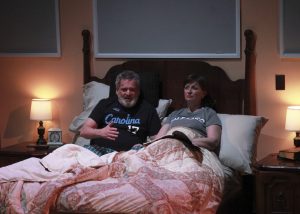
Whatever changes that Della goes through occur almost too quickly before our eyes, although clearly not fast enough for the playwright. It is obvious that she wants to see society change in a more inclusive, tolerant direction, but perhaps a kumbaya moment is not in the cards. There are two levels here: a reconciliation among family members versus a larger truce among our entire nation in terms of politics and religion.
Just as feeding all of ISIS is unrealistic, so is Della’s belief that sharing some delicious cake can paper over longstanding differences in beliefs, values, and lifestyles. Hence the way that Della tries to resolve these personal conflicts is in the best way she knows how: by imparting the pleasures of dessert. This “solves” the larger issue of family disagreements, in much the same way as offering an out-of-touch relative a rum ball during a contentious Thanksgiving dinner. While some amount of understanding, if not acceptance, can potentially be gained by having a meaningful conversation over a peace offering, there is a larger question here: When are the differences irreconcilable? How much personal conflict must there be between two people before both sides decide to go their separate ways and detach themselves from the relationship?
It is in our DNA to want to be loved, accepted, and understood. But it doesn’t always turn out that way. Jen tries much too hard to be accepted by a woman whose thinking is in a very different place from her own. She claws and begs Della to approve of her and her partner. But to what end? It’s very hard for Jen (and by extension for Macy) when her next-of-kin fails to understand who she is and what she has become. Though she may not agree with Jen, at least Della listens and reflects on some of what she has to say. There are so many people who don’t even care to try.
The Buffalo Theatre Ensemble’s production of “The Cake” is playing through March 1, 2020, at the Playhouse Theatre of the McAininch Arts Center, at College of DuPage, 425 Fawell Blvd, Glen Ellyn, Illinois.
Tickets are $42.
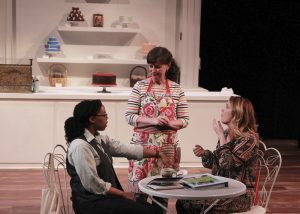 Performances are at 8:00 p.m. Thursday-Saturday, and 3:00 p.m. Sunday.
Performances are at 8:00 p.m. Thursday-Saturday, and 3:00 p.m. Sunday.
A post-show discussion with the director, actors, and crew will be held on Friday, February 7, 2020.
The ASL performance (for the hearing-impaired) is on Thursday, February 20, 8:00 p.m.
To access reserved seating in view of the interpreters for the signed performance, call the box office at 630.942.2141or 630.858.9692 (TDD) or visit AtTheMAC.org for additional information.
For tickets or more information, visit AtTheMAC.org or call 630-942-4000.
The McAninch Arts Center at College of DuPage is located 25 miles west of Chicago near I-88 and I-355.
to see what others are saying, visit www.theatreinchicago.com, go to Review Round-Up and click at “The Cake”.





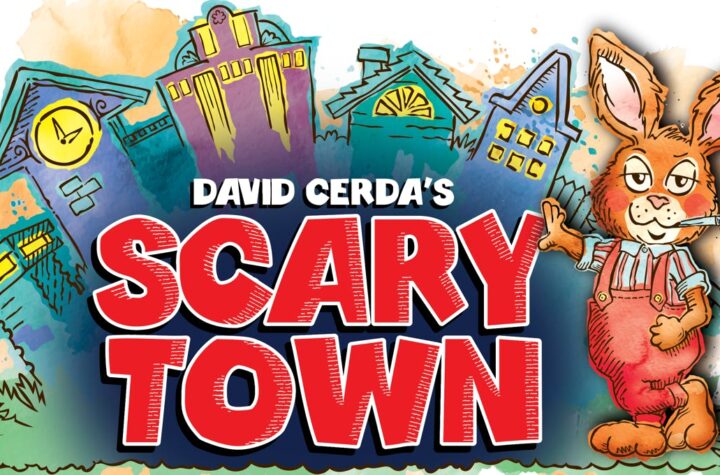
More Stories
“Henry Johnson”
“Scary Town” reviewed by Frank Meccia
“Translations”